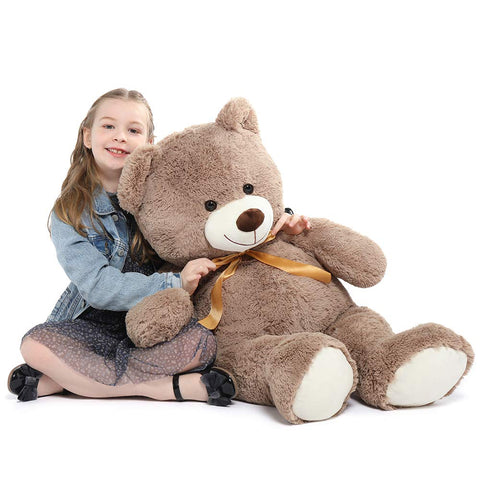
Why Do People Get Emotionally Attached To Stuffed Animals? Top 10 Reasons
Why Do People Get Emotionally Attached To Stuffed Animals? Top 10 Reasons
People have different things that they get attached to. For some, it may be a family member or a close friend. For others, it may be a pet they've had for years. And for still others, it may be a stuffed animal they've had since they were young.
People get emotionally attached to stuffed animals for a variety of reasons
Following are top 10 reasons why people get emotionally attached to stuffed animals:
1. Adorable
People get emotionally attached to stuffed animals because they are adorable. Cute things make people happy, and people like to be satisfied. Stuffed animals are soft, huggable, and usually have friendly faces. They reminded people of childhood when life was simpler and everything was new. For some people, stuffed animals provide comfort in difficult times. These people can hug their stuffed animals for support when life gets tough. Read Best huggable stuffed animals
2. Happiness
People get attached to stuffed animals because they provide happiness. For some, they are their first friend, and for others, they provide comfort in difficult times. They can symbolize hope in challenging situations or a reminder of happy memories. Whatever the reason, people feel a strong emotional connection to their stuffed animals.
3. The calming and soothing effect
When people are young, they often have a stuffed animal that provides comfort. This is because stuffed animals provide a calming and soothing effect for people. This is the only thing that helps some people calm down and feel better in difficult situations. In addition, stuffed animals symbolize safety and security, which is why some people become attached to them emotionally. Read Best realistic weighted sloth stuffed animals.
4. Security:
People get emotionally attached to stuffed animals for a variety of reasons. One reason is that they feel secure. For some people, having a stuffed animal provides them with a sense of comfort and security that they may not get from other aspects of their lives.
This may be due to a lack of parental affection or support or traumatic experiences. Stuffed animals can also provide an outlet for emotions, such as sadness or anger. In addition, they can serve as a reminder of happy memories or help people feel less alone in difficult times.
Ultimately, people becoming attached to stuffed animals varies from person to person. However, the underlying need for security is often a common factor. Check out the Pink elephant stuffed animal.
5. Comfort:
When people are young, they often receive a stuffed animal as a gift. For many, this toy becomes a cherished companion. They keep it through thick and thin and take it wherever they go. Why do people become so emotionally attached to these inanimate objects?
For some, they provide comfort during difficult times. These furry friends offer a sense of security and stability when life is tough. They can also be a source of comfort during loneliness or sadness. Read Best yellow and grey moon plush for toddlers.

6. Represent childhood memories
For others, stuffed animals represent childhood memories. They may remember the first time they received one or the particular toy that was their favorite. These objects remind them of happy moments from their past and bring back positive feelings.
7. Help ease loneliness
Many people believe that stuffed animals help ease loneliness. According to one study, "72% of participants felt less lonely when they had their favorite stuffed animal." This is because, for some people, stuffed animals provide a sense of companionship that they may not get from other people. Check out the Grey elephant stuffed animal.
Stuffed animals can also act as a security blanket for people who are feeling vulnerable or scared. For example, if a child has a bad dream, they may find comfort in being able to cuddle with their favorite toy. This can help them feel safe and secure, which can ultimately help them feel less lonely.

8. Reduce stress
When stressed out, people often turn to their favorite stuffed animal for comfort. This is because stuffed animals help to reduce stress levels. For example, when people hug or touch their stuffed animal, it releases oxytocin, a hormone that helps reduce stress levels. In addition, when people look at their stuffed animal, it can help to raise serotonin levels, which also helps to reduce stress levels. Read What is the best stuffing for stuffed animals.
9. Helps to heal from trauma
When most people think of stuffed animals, they think of children's toys. However, for some people, stuffed animals are not just toys but trusted friends who help them through difficult times. People become emotionally attached to their stuffed animals because they help to heal from trauma.
Stuffed animals can be beneficial for children who have experienced trauma. Children who have gone through traumatic events may find it difficult to trust others. Stuffed animals can give them a sense of trust and security, which can help them to heal from their trauma. Read Best weighted elephant stuffed animals for babies.
10. Best Friends
For a lot of people, stuffed animals were their first friends. They were always there for you when you needed them and never judged you. They helped you through tough times and made you feel better when you were sad. People get emotionally attached to them because they are like best friends.
How emotional support stuffed animals help people?
For many people, a stuffed animal is more than a toy. It can be an emotional support system during difficult times in life. These stuffed animals provide comfort and security to people who may be struggling with a mental health disorder, going through a tough time, or coping with a traumatic experience. Check out the best graduation teddy bear gift for her.
There are many reasons why a stuffed animal can provide comfort. For some people, the familiarity of the toy offers reassurance. Stuffed animals are often soft and cuddly, which can help soothe anxiety and loneliness. They can also act as a physical representation of hope and love during tough times.
Some hospitals and mental health facilities allow patients to bring their emotional support stuffed animals for treatment. This can help reduce stress levels and promote healing.
Types of emotional support animals
There are many different types of stuffed animals that can be used as an emotional support tool. For example, some people might feel comforted by a small, soft animal, while others might prefer something with more personality.
Some people might prefer a furry animal, like a dog or cat, while others might prefer a more cartoonish character, like a teddy bear or bunny. Some people even prefer more abstract symbols, like an elephant or giraffe. The important thing is that the stuffed animal makes the person feel supported and loved.

Some people might choose to have multiple emotional support stuffed animals for each type of situation they find themselves in. For example, they might have a dog for feeling energetic and happy and a bunny when they need to calm down. Others might have one primary emotional support stuffed animal they take everywhere. Check out Best plush lion stuffed animals for kids.
No matter what type of emotional support stuffed animal someone chooses, it's important that they find one that makes them feel good.
The benefits of using a stuffed animal as an emotional support
A stuffed animal can provide comfort and security to a child during difficult times. For example, when a child feels scared or sad, they may be given a stuffed animal to hug and hold. This can help the child feel better by providing emotional support. It can help children to learn how to deal with their emotions healthily. Additionally, it can help children to develop strong relationships with others.
How stuffed animals help children explore emotions and relationships?
When it comes to pretending play, few things are as versatile or fun as stuffed animals. These cuddly creatures can provide children with a safe space to explore their emotions and relationships. By pretending to be a bear, for example, a child might learn how to cope with feelings like anger or sadness. Pretending to care for a stuffed animal can also help children develop empathy and compassion. In short, stuffed animals provide an excellent way for children to explore the world around them. Check out How to make a weighted stuffed animal.
Stuffed animals also teach children how to care for others
Most parents would agree that giving a child a stuffed animal is one of the simplest and most effective ways to show them how to care for another living creature. A well-loved teddy bear can teach a child how to be gentle, compassionate, and nurturing. Stuffed animals also allow children to role-play different caring scenarios, such as comforting a sad friend or helping an injured animal. This can help foster empathy and compassion in children early, setting them up for a life of kindness and generosity.
Children develop strong bonds with their favorite stuffed animals
A favorite stuffed animal is often a child's most cherished possession. These animals become vital to children, who often develop strong bonds. In addition, these stuffed animals can hold childhood memories and can be a source of comfort in difficult times. Read Weighted stuffed animals for anxiety adults.
The importance of emotional attachments to stuffed animals
For many people, stuffed animals are not just toys; they are cherished friends that provide comfort and support during difficult times. Psychologists believe these emotional attachments are necessary because they help us regulate our emotions and cope with stress. For example, in a study, researchers found that participants who had strong emotional attachments to their stuffed animals reported feeling less anxious and lonely and were more likely to have better self-esteem.

Stuffed animals can also play an essential role in helping children to develop healthy relationships. Children who had strong emotional attachments to their stuffed animals were more likely to be compassionate and cooperative. They were also less likely to exhibit aggressive behavior.
Give it a read: Why do dogs pull stuffing out of stuffed toys?
